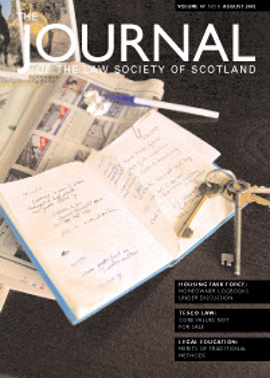What price the core values
What is at stake are the core values which define the identity of lawyers in independent practice (that is to say guaranteed independence, avoidance of conflicts of interest, and client confidentiality). Failure to understand and protect these values will result in irreversible damage to the interests of individual consumers of solicitors’ services and the public interest.
We take as given that this debate should not be feared. It will always be incumbent on the profession to make sure that its regulatory systems and content are fit for purpose and adapted to take account of changing social and economic conditions. Where any practice or regulation, properly understood, is restrictive of competition and not otherwise justified we would not seek to defend it. But the core values are not negotiable. We need to assert this without equivocation no matter how inconvenient or out of line with policies of the moment or commercial expediency.
We are concerned first about a Nelsonian eye being turned to recent developments, particularly the European Court of Justice decision with regard to the Bar of the Netherlands. In this case, the court upheld the ban on multi-disciplinary practices between accountants and lawyers in Holland.
This dealt directly with the interface between competition and the core values. It cannot be dismissed as dealing only with different circumstances peculiar to the Netherlands, or exclusively with competition issues, or with the particular structure of a multi-disciplinary partnership between lawyers and accountants. The court validated an absolute regulatory prohibition on any form of mixed control partnership, which was implemented by the Dutch Bar in substitution for a more limited prohibition precisely because the absolute ban was considered to be the minimum necessary to protect the core values.
Therefore, the true implications of the Dutch decision are that the court regarded issues of structure and control as of importance; recognised that effective regulation was necessary to guarantee and protect consumer interests by securing core values, and confirmed scepticism as to the efficacy of cosmetic processes such as Chinese walls.
The case could not be more apposite. It is of significance because the ultimate judicial authority on EC competition law and principles ( on which principles UK competition law is based) has made clear that the legal profession’s core values must not and should not be sacrificed to the god of competition.
Everything about our understanding of the real-world tells us that unbridled commercialism will not work in the public interest, and that there has never been a greater need than now for genuine and guaranteed independence of solicitors’ services. No solicitor can serve two masters, and he who pays the piper will ultimately call the tune. It is naïve and against all the evidence to think that the core values can can be preserved effectively without regulating and controlling the structure within which the services are delivered.
This point is captured in the current American Bar Association resolution, which states; “The sharing of legal fees with non-lawyers and the ownership and control of the practice of law by non-lawyers are inconsistent with the core values of the legal profession.”
The media coverage appears to have been dominated by briefings from the proponents of the proposals with no serious attention being given to the core values and the real world implications of the planned de-regulation. Every impression is given of unquestioning acceptance of the premise that the present evolved regulatory framework is an elaborate conspiracy by lawyers against an unsuspecting public. That premise is wholly wrong. The tools of regulation of the legal profession have been based on the public interest, designed to preserve the core values effectively, and forged on the anvil of experience. That is why they deal both with the regulation of individual practitioners and the context in which they practise. The lack of recognition of this creates a self-fulfilling caricature of the solicitors’ profession as reactionary, protectionist and out of date.
These views are offered as a contribution from a different and perhaps detached perspective which we hope will help to ensure that all relevant arguments are addressed and debated openly and in a more balanced way. It is understood that the de-regulation proposals as initially proposed will proceed only if some way can be found of ensuring that third party clients of an employed solicitor can be guaranteed the same effective levels of protection as under the present regulatory structure. For the reasons we have set out most lawyers might well feel that this will prove to be an impossible task.
For all lawyers there is a common position which should unite us: the core values are not for sale. These permanent values are more important than commercial expediency. All that we know as lawyers tells us that these values will always be subject to attack will always need to be defended and should not be compromised. Who is going to defend the core values, by definition, if not a genuinely independent legal profession? Here we should stand - we can do no other.
In this issue
- Scottish Solicitors’ Discipline Tribunal
- What price the core values
- “It’s good to talk”
- Homeowner logbooks a step too far
- The Judicial Appointments Board – a misnomer
- Changed days
- In praise of rote learning
- The best laid plans
- Communication can curb complaints
- Separate probation and community service
- Simplifying insolvency proceedings?
- Online negotiation – changing the norms
- Website reviews
- Under pressure
- In practice
- Europe
- Plain speaking
- Book reviews
- When law met hip-hop






